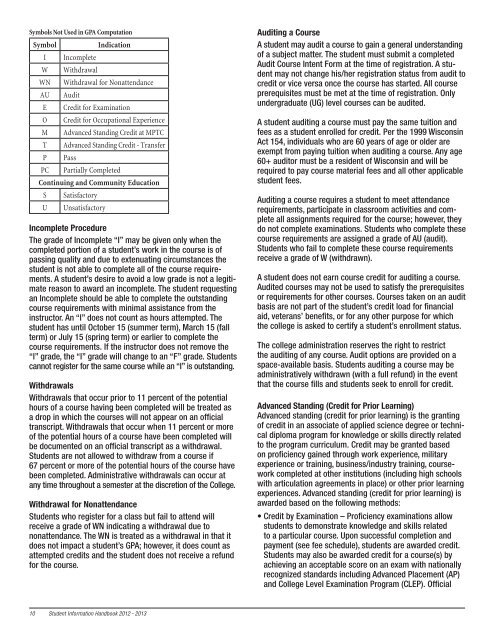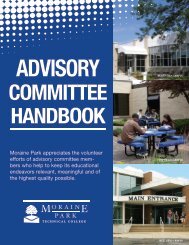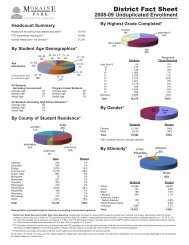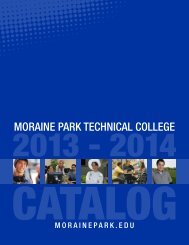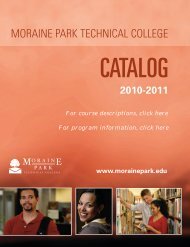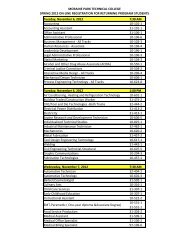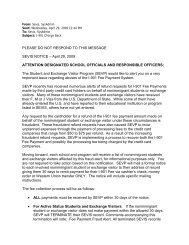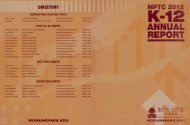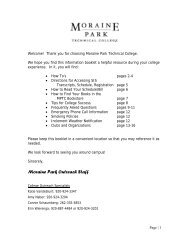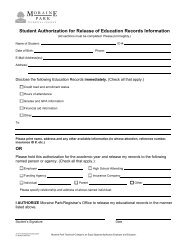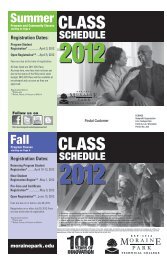Student Handbook - Moraine Park Technical College
Student Handbook - Moraine Park Technical College
Student Handbook - Moraine Park Technical College
You also want an ePaper? Increase the reach of your titles
YUMPU automatically turns print PDFs into web optimized ePapers that Google loves.
Symbols Not Used in GPA Computation<br />
Symbol Indication<br />
I Incomplete<br />
W Withdrawal<br />
WN Withdrawal for Nonattendance<br />
AU Audit<br />
E Credit for Examination<br />
O Credit for Occupational Experience<br />
M Advanced Standing Credit at MPTC<br />
T Advanced Standing Credit - Transfer<br />
P Pass<br />
PC Partially Completed<br />
Continuing and Community Education<br />
S Satisfactory<br />
U Unsatisfactory<br />
Incomplete Procedure<br />
The grade of Incomplete “I” may be given only when the<br />
completed portion of a student’s work in the course is of<br />
passing quality and due to extenuating circumstances the<br />
student is not able to complete all of the course requirements.<br />
A student’s desire to avoid a low grade is not a legitimate<br />
reason to award an incomplete. The student requesting<br />
an Incomplete should be able to complete the outstanding<br />
course requirements with minimal assistance from the<br />
instructor. An “I” does not count as hours attempted. The<br />
student has until October 15 (summer term), March 15 (fall<br />
term) or July 15 (spring term) or earlier to complete the<br />
course requirements. If the instructor does not remove the<br />
“I” grade, the “I” grade will change to an “F” grade. <strong>Student</strong>s<br />
cannot register for the same course while an “I” is outstanding.<br />
Withdrawals<br />
Withdrawals that occur prior to 11 percent of the potential<br />
hours of a course having been completed will be treated as<br />
a drop in which the courses will not appear on an official<br />
transcript. Withdrawals that occur when 11 percent or more<br />
of the potential hours of a course have been completed will<br />
be documented on an official transcript as a withdrawal.<br />
<strong>Student</strong>s are not allowed to withdraw from a course if<br />
67 percent or more of the potential hours of the course have<br />
been completed. Administrative withdrawals can occur at<br />
any time throughout a semester at the discretion of the <strong>College</strong>.<br />
Withdrawal for Nonattendance<br />
<strong>Student</strong>s who register for a class but fail to attend will<br />
receive a grade of WN indicating a withdrawal due to<br />
nonattendance. The WN is treated as a withdrawal in that it<br />
does not impact a student’s GPA; however, it does count as<br />
attempted credits and the student does not receive a refund<br />
for the course.<br />
10 <strong>Student</strong> Information <strong>Handbook</strong> 2012 - 2013<br />
Auditing a Course<br />
A student may audit a course to gain a general understanding<br />
of a subject matter. The student must submit a completed<br />
Audit Course Intent Form at the time of registration. A student<br />
may not change his/her registration status from audit to<br />
credit or vice versa once the course has started. All course<br />
prerequisites must be met at the time of registration. Only<br />
undergraduate (UG) level courses can be audited.<br />
A student auditing a course must pay the same tuition and<br />
fees as a student enrolled for credit. Per the 1999 Wisconsin<br />
Act 154, individuals who are 60 years of age or older are<br />
exempt from paying tuition when auditing a course. Any age<br />
60+ auditor must be a resident of Wisconsin and will be<br />
required to pay course material fees and all other applicable<br />
student fees.<br />
Auditing a course requires a student to meet attendance<br />
requirements, participate in classroom activities and complete<br />
all assignments required for the course; however, they<br />
do not complete examinations. <strong>Student</strong>s who complete these<br />
course requirements are assigned a grade of AU (audit).<br />
<strong>Student</strong>s who fail to complete these course requirements<br />
receive a grade of W (withdrawn).<br />
A student does not earn course credit for auditing a course.<br />
Audited courses may not be used to satisfy the prerequisites<br />
or requirements for other courses. Courses taken on an audit<br />
basis are not part of the student’s credit load for financial<br />
aid, veterans’ benefits, or for any other purpose for which<br />
the college is asked to certify a student’s enrollment status.<br />
The college administration reserves the right to restrict<br />
the auditing of any course. Audit options are provided on a<br />
space-available basis. <strong>Student</strong>s auditing a course may be<br />
administratively withdrawn (with a full refund) in the event<br />
that the course fills and students seek to enroll for credit.<br />
Advanced Standing (Credit for Prior Learning)<br />
Advanced standing (credit for prior learning) is the granting<br />
of credit in an associate of applied science degree or technical<br />
diploma program for knowledge or skills directly related<br />
to the program curriculum. Credit may be granted based<br />
on proficiency gained through work experience, military<br />
experience or training, business/industry training, coursework<br />
completed at other institutions (including high schools<br />
with articulation agreements in place) or other prior learning<br />
experiences. Advanced standing (credit for prior learning) is<br />
awarded based on the following methods:<br />
• Credit by Examination – Proficiency examinations allow<br />
students to demonstrate knowledge and skills related<br />
to a particular course. Upon successful completion and<br />
payment (see fee schedule), students are awarded credit.<br />
<strong>Student</strong>s may also be awarded credit for a course(s) by<br />
achieving an acceptable score on an exam with nationally<br />
recognized standards including Advanced Placement (AP)<br />
and <strong>College</strong> Level Examination Program (CLEP). Official


